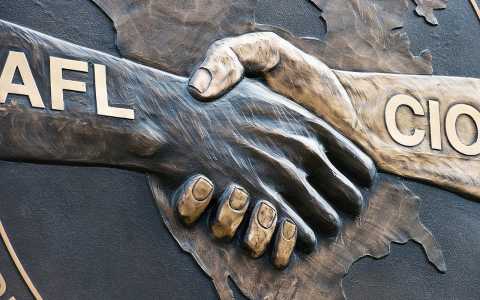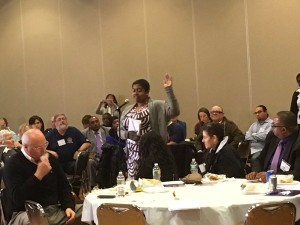 Part of national effort by AFL-CIO to strengthen the entire Labor Movement for ALL workers
Part of national effort by AFL-CIO to strengthen the entire Labor Movement for ALL workers
In a candid and challenging effort to determine the impact race has had, and is still having, inside the Labor Movement — and to find ways to unify all races so that ALL working people can become UNITED as a force for positive change for workers in America — St. Louis on Feb. 1 will host the fourth in a series of meetings on race under the auspices of the AFL-CIO’s Commission on Racial and Economic Justice formed last February by the AFL-CIO Executive Council.
The day-long meeting will be held at a union facility here but will not be open to the public, only to AFL-CIO members by invitation only so that the commission can obtain a frank and honest appraisal of race relations in the local Labor Movement without the issue of presenters being pressured by outside influences.
Expected to attend are a number of national AFL-CIO presidents as well as AFL-CIO President Richard Trumka.
DAY-LONG MEETING

The day will be broken into two major sessions:
• Morning: testimony from five rank-and-file union members on how they perceive the issue of race in the unions and what they see as potential solutions.
Additionally, after the rank-and-file testimony, there will be a frank and open discussion on the race issue with union leadership.
Members wishing to attend the morning session should contact their union for an invitation.
• Afternoon: an open discussion of the race issue in the St. Louis Labor Movement by all the participants attending the invitation-only meeting, which will include the Labor Council’s executive board, leaders of other unions, various community partners and other constituency groups.
There will also be a session on the Black Lives Matter efforts, which was the original basis of forming the AFL-CIO commission after the Ferguson happening.
FUNDAMENTAL OBSTACLE
In its formation statement last February, the AFL-CIO stated that the goal of this nationwide effort is:
• Analyze: ”Analyze the way racism weakens the collective power of all working people and harms both people of color and white workers” and
• Educate: “Educate workers and analyze the way racism weakens the collective power of all working people and harms both people of color and white workers.”
• Make recommendations for change: “Over the (coming) months the AFL-CIO will identify (and ultimately make recommendations for improving) practices within local labor bodies that build solidarity among white members and members of color, and expose practices that undermine or obstruct solidarity and constructive relationships.
TO MAKE US STRONGER
“Racism has always been a key tactic of employers seeking to divide us,” noted the formation statement.
Making an honest appraisal of the past, the statement candidly admits: “…we … have an ugly history of racism in our own movement. Yet at the same time the Labor Movement has a proud history of standing for racial and economic justice.
“When we have embraced our better selves we have always emerged stronger in every sense. And whenever we have succumbed to the temptation to see some working people as better than others, we have always ended up weaker.
“If we are to succeed as a movement, the full range of working peoples’ voices — race, gender identity, ethnicity, disability and sexual orientation — must be heard in the internal processes of our movement. To be able to stand together we have to understand where all of us are coming from.“
KEY ISSUES
Several key issues were noted in the formation statement:
• Jobs – “We fight for full employment. White unemployment is 4.9 percent — which is not good enough. But black unemployment is 10.3 percent, higher than it ever got for whites in the entire economic crisis. To stand together on jobs, we have to hear from each other about the different experiences we live.”
• Criminal Justice – “The growing movement for racial justice around these issues is greater than anything since the Civil Rights era… African-Americans make up 13 percent of our population, but 38 percent of the incarcerated.
“Young black males are 21 times more likely to be killed by law enforcement than young white males. Those who suffer are our members and our members’ children.”
• Response to issues – “The Labor Movement must respond. How can we do so unless the experience of all union members is heard in the conversation?
“It is time for a frank and thoughtful discussion on racial inequality and its economic impact—starting first in the House of Labor.”
NATIONAL HEARINGS
The first of the commission’s hearings were held in Boston, Oalkand, Calif., and Cleveland.
At the most recent meeting last December in Boston, AFL-CIO Vice President Tefere Gebre made the point dramatically:
“… (Labor must) lead the way by having honest conversations to address the challenging issues we face within our own movement to achieve racial and economic justice. We’ve got to take our responsibility seriously and make it part of our work every day.”

